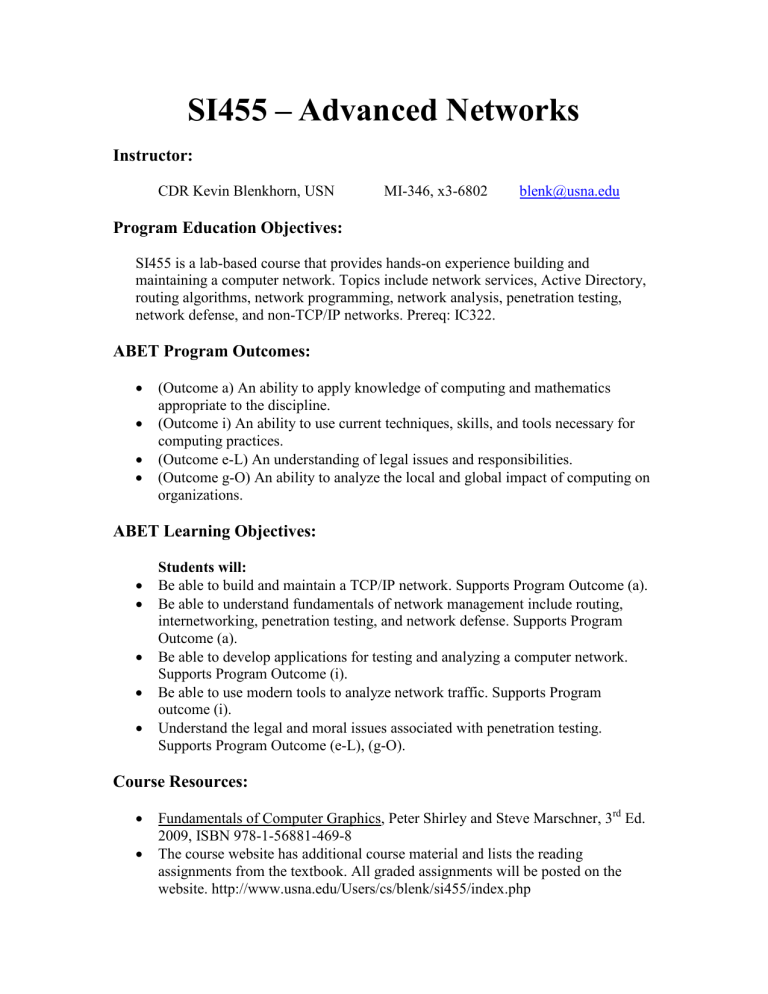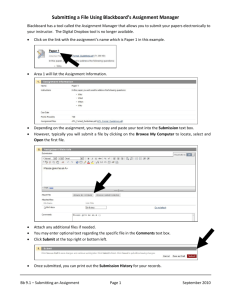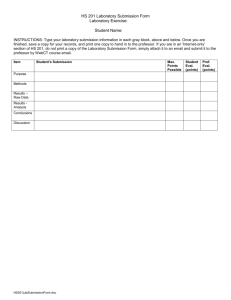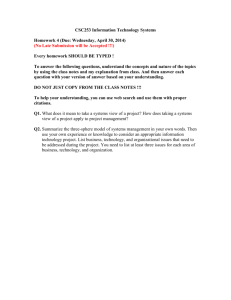SI455 – Advanced Networks Instructor: Program Education Objectives:

SI455 – Advanced Networks
Instructor:
CDR Kevin Blenkhorn, USN MI-346, x3-6802 blenk@usna.edu
Program Education Objectives:
SI455 is a lab-based course that provides hands-on experience building and maintaining a computer network. Topics include network services, Active Directory, routing algorithms, network programming, network analysis, penetration testing, network defense, and non-TCP/IP networks. Prereq: IC322.
ABET Program Outcomes:
•
(Outcome a) An ability to apply knowledge of computing and mathematics appropriate to the discipline.
•
(Outcome i) An ability to use current techniques, skills, and tools necessary for computing practices.
•
(Outcome e-L) An understanding of legal issues and responsibilities.
•
(Outcome g-O) An ability to analyze the local and global impact of computing on organizations.
ABET Learning Objectives:
Students will:
•
Be able to build and maintain a TCP/IP network. Supports Program Outcome (a).
•
Be able to understand fundamentals of network management include routing, internetworking, penetration testing, and network defense. Supports Program
Outcome (a).
•
Be able to develop applications for testing and analyzing a computer network.
Supports Program Outcome (i).
•
Be able to use modern tools to analyze network traffic. Supports Program outcome (i).
•
Understand the legal and moral issues associated with penetration testing.
Supports Program Outcome (e-L), (g-O).
Course Resources:
•
Fundamentals of Computer Graphics, Peter Shirley and Steve Marschner, 3 rd
Ed.
2009, ISBN 978-1-56881-469-8
•
The course website has additional course material and lists the reading assignments from the textbook. All graded assignments will be posted on the website. http://www.usna.edu/Users/cs/blenk/si455/index.php
Absences:
Students are responsible for obtaining any material missed due to an absence.
Additionally, students must ensure that their work is submitted by the deadline regardless of other commitments, e.g., duty, SIR, movement orders. Should bona fide emergencies arise, e.g., emergency leave, hospitalization, it is the responsibility of the student to coordinate with the instructor.
Honor:
We learn both by collaborating and by solving problems ourselves. Different amounts of collaboration are allowed on each assignment in order to meet learning objectives.
You are responsible for knowing how much you are allowed to collaborate on each assignment.
See the attached SI455 Collaboration Policy for a description of the various levels of collaboration allowed.
Unless otherwise denoted in writing, the Collaboration Policies for each type of assignment will be as shown in the table below:
Assignment Type
Homework
Labs
Exams
Default Collaboration Policy
CP-1
CP-6 / CP-9
CP-1
Extra Instruction:
Extra Instruction (EI) is available and encouraged. EI may be scheduled or is available on a drop-in basis. Requests for EI may be made via email/phone.
Class Decorum
You are a Naval Officer candidate - be professional
•
Participate in the class
•
Be punctual
•
Stay awake (closable beverages are permitted in class)
Section leader
•
Call the section to attention at the beginning and end of class.
•
Take muster and report absences to the instructor.
•
Contact the department office (3-6800, Room 346) if instructor is more than
10 minutes late.
•
Class is expected to study quietly if instructor is absent. Class is not dismissed.
2
Course Grade:
Exam 1
Exam 2
Final Exam
Labs
Homework/Quizzes
Instructor Discretion*
6-Week
30%
50%
10%
10%
12-Week
20%
20%
40%
10%
10%
Final
15%
15%
20%
30%
10%
10%
* Class participation counts (a lot) towards your final grade. You are expected to ask questions and offer input during discussions.
Assignments are due at the beginning of class. Assignments handed in late will receive 30% off for each day late.
All Labs must be handed in to receive a passing grade for the course, even if they are handed in late for no credit. This rule applies for each grading period.
Exams:
The 12-week exam will focus on the material from weeks 7-12. The final exam will be cumulative. If for some reason a make-up exam will be required, inform the instructor at least 1 week in advance.
Your final grade in the class will be no more than one letter grade higher than your final exam, regardless of your average for the class. For example, if you have an A average in the course but get a D on your final exam, then your final grade will be no higher than a C.
Labs:
Labs will be held at the end of most classes. During each lab, an assignment will be given to provide practical application of the material covered. Many of the labs involve building a network as a team. These labs are cumulative and cannot be skipped.
3
Homework:
Homework will generally be given as prep work before the material is presented in a lecture. Homework will be listed on the course website on the date that it is due. Be sure to check the website for homework links prior to each class date.
The purpose of homework is to ensure that you have read the material and have learned enough of it to be prepared for the lecture. Unless otherwise stated, homework must be completed individually, with no assistance other than the assigned reference book.
Submitted, Approved,
CDR Kevin Blenkhorn Dr. Steve Miner
______________________
Course Coordinator
________________________
Department Chair
4
Subj: SI455 COLLABORATION POLICY
Ref: (a) SI455 Course Policy – AY2014 Spring
31 Dec 2013
1. Purpose. Per reference (a), the following defines the collaboration levels that will be used in SI455. You are charged with understanding and executing the honor policy, and seeking clarification at any time if there is a potential misconception; if in doubt, seek clarification from your Instructor.
2. Collaboration Policies. Our learning is enhanced through activities; some learning activities will be individual effort, while other learning activities will allow collaboration.
Copying will never be considered as collaboration; copying will always be considered as a violation of the honor policy. Discussion with a course instructor is always allowed. a. The terms discuss , collaborate , and copy each have separate definitions in the
English language. In regards to the collaboration policy, the following definitions shall apply: discuss (v): To communicate via verbal or non-verbal means about a concept or topic. Discuss does not mean communicating about a specific answer to a problem. collaborate (v): Two definitions: (1) To split up an assignment into parts in a manner where individuals work on separate parts independently. (2) To work together on an assignment such that all individuals are working on the solution at the same time, on the same computer. Both definitions require that all individuals provide roughly equal input on the solution. copy (v): To reproduce via electronic or non-electronic means the work of another individual. b. All collaboration must be properly documented. Specifically – if you receive help from any person on an assignment, you must list that person’s name on the assignment that you hand in.
Design and implementation must be the work of the individual submitting the final product.
Collab.
Policy
Definition
CP-0
CP-1
CP-2
Collaboration: No collaboration of effort is allowed.
Discussion: No discussion of assignment with others except a course instructor is allowed.
Resources: No use of resources is allowed.
Submission: Individual submission.
Collaboration: No collaboration of effort is allowed.
Discussion: No discussion of assignment with others except a course instructor is allowed.
Resources: Use of resources is limited to the resources specified on the assignment.
Submission: Individual submission.
Collaboration: No collaboration of effort is allowed.
Discussion: No discussion of assignment with others except a course instructor is allowed.
Resources: Documented use of authorized resources is allowed.
Submission: Individual submission.
5
Collab.
Policy
CP-3
CP-4
CP-5
CP-6
CP-7
CP-8
CP-9
CP-10
CP-11
Definition
Collaboration: No collaboration of effort is allowed.
Discussion: Discussion of assignment concepts/topics with other students in the course is allowed.
Resources: Documented use of authorized resources is allowed.
Submission: Individual submission.
Collaboration: No collaboration of effort is allowed.
Discussion: Discussion of assignment concepts/topics with any current student at the institution is authorized.
Resources: Documented use of authorized resources is allowed.
Submission: Individual submission.
Collaboration: Collaboration of effort with assigned group members is allowed.
Discussion: No discussion of assignment with non-group members except a course instructor is allowed.
Resources: Documented use of authorized resources is allowed.
Submission: Individual submission.
Collaboration: Collaboration of effort with assigned group members is allowed.
Discussion: Discussion of assignment concepts/topics with other students in the course is allowed.
Resources: Documented use of authorized resources is allowed.
Submission: Individual submission.
Collaboration: Collaboration of effort with assigned group members is allowed.
Discussion: Discussion of assignment concepts/topics with any current student at the institution is authorized.
Resources: Documented use of authorized resources is allowed.
Submission: Individual submission.
Collaboration: Collaboration of effort with assigned group members is allowed.
Discussion: No discussion of assignment with non-group members except a course instructor allowed.
Resources: Documented use of authorized resources is allowed.
Submission: Group submission.
Collaboration: Collaboration of effort with assigned group members is allowed.
Discussion: Discussion of assignment concepts/topics with other students in the course is allowed.
Resources: Documented use of authorized resources is allowed.
Submission: Group submission.
Collaboration: Collaboration of effort with assigned group members is allowed.
Discussion: Discussion of assignment concepts/topics with any current student at the institution is authorized.
Resources: Documented use of authorized resources is allowed.
Submission: Group submission.
Collaboration: Collaboration of effort with any current student at the institution is allowed.
Discussion: Discussion of assignment with any current student at the institution is allowed.
Resources: Documented use of authorized resources is allowed.
Submission: Group submission.
6



